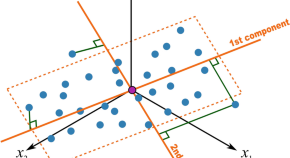A novel influence quantification model on Instagram using data science approach for targeted business advertising and better digital marketing outcomes
Authors (first, second and last of 7)

Collection
Social network analysis is one of the most promising fields in analytics and is used to track and analyse human behaviour, emotion, social relationships, communication trends online. Social media has emerged as a prominent new technique for monitoring human behaviour and emotion in social networks. Social Networks are an integral part of our everyday life. Online social media is an emerging discipline inside the study of human behaviour and emotion analysis. Social network analysis is a powerful tool that has been used for a wide range of purposes to gain valuable insights into business and society.
Social network analysis is being utilised more and more to identify and target high-risk employees or customers who are likely to have issues that could disrupt organisational operations. Social network analysis can help quantify relationships and improve risk management decision-making by identifying troublesome linkages between people and determining the level of risk posed by each person in the network. However, this approach has limits that must be recognised when applying it to real-life circumstances. Businesses today increasingly face the challenge of rapidly growing volumes of noisy data.
There is currently a trend in analysing human behaviour by observing individuals' social networks with the hope of extracting usable information to develop business intelligence. Social network analysis has become critical for comprehending human behaviour, emotion, and crowd psychology. In today's society, social media plays a vital role in an individual's life. Users of information technology are increasingly resorting to social networking sites for emotional assistance through peer support groups, while some have utilised this technology to distribute misleading information. The power of comprehending human behaviour as a new evolving application is also still limited by the accuracy of social networks. Social network analysis will play a role in business intelligence and business decision support shortly. The growing interest in social networks and the popularity of social media forums are generating an ever-increasing amount of data, which provide a tremendous foundation for analysing human behaviours and emotions. This Special Issue seeks original, high-quality submissions in the Role of Social Network Analysis in Human Behaviour and Emotion Analysis for Business Intelligence. We welcome suggestions addressing scalability and sustainability for real-world applications and encourage research investigating new emerging sensing technologies still at the proof-of-concept stage. Submitted papers must not be under consideration elsewhere. Papers are invited that consider, but are not limited to, the following themes:
1. There is a novel uneven mobile neural computational complexity for series data prediction in social networks.
2. A Human Language Connection to Database Systems using Ongoing Analytic Processor Fractal Pattern.
3. Organisational culture's impact in improving social security corporation's human capital.
4. A Framework for human development index in an emerging economy
5. Developing a Cybersecurity Assessment Methodology for Cloud Business Analytics for Microenterprises.
6. A social behaviour Smart Power Ecosystem for Co-Making Environments Using Wireless Sensors Integration.
7. A Review and Framework for Design and Assessment of Human Behavior Modification Strategies in Wildlife Rehabilitation and Interaction Environments.
8. Unsupervised Evaluation of Human Behavior in Ubiquitous Computing Using Stochastic Modeling.
9. A Paradigm for Business Intelligence and Insights for Reliable and Cheap Energy Data Processing.
10. Social and Emotional Intelligence's Effects on System Behavior in Worldwide Entrepreneurs.
Dr. Jungpil Shin is a professor of School of Computer Science and Engineering, The University of AIZU and Supervisor of Pattern Processing Lab, The University of AIZU. He is serving to the University of AIZU as an academician since 1999. His current research interests are pattern recognition, HCI (Human Computer Interaction), image processing, computer vision, and medical diagnosis.
Md. Al Mehedi Hasan received the B.Sc.,M.Sc., and Ph.D. degrees in computer science and engineering from the Department of Computer Science and Engineering, University of Rajshahi, Rajshahi-6205, Bangladesh, in 2005, 2007, and 2017, respectively. He became a Lecturer, an Assistant Professor, an Associate Professor, and a Professor at the Department of Computer Science and Engineering, Rajshahi University of Engineering and Technology (RUET), Rajshahi-6204, Bangladesh in 2007, 2010, 2018, and 2019, respectively.
Dr. Yong Seok Hwang received his Dept. of Electronics Engineering, Pusan National University, Pusan, Korea in 2004. He completed his B.Sc., and M.Sc., from the Dept. of Electronics Engineering Pukyong National University, Pusan, Korea. He is currently working as Professor in Nano Device Application Center (NDAC), Kwangwoon University, Seoul, Korea. His research interest include Hologram image processing, Machine learning, human-computer interaction, non-touch interfaces, human gesture recognition, Digital therapeutics for autism diagnosis.

